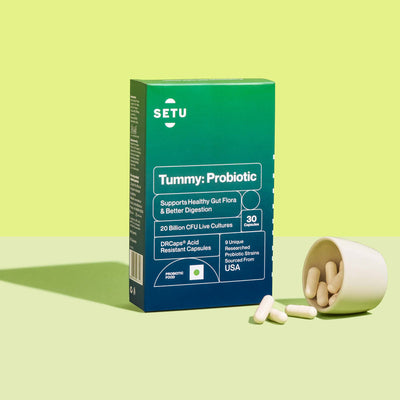How Probiotics And Omega Help You Be Happy
29 Jan 2021
Grief and sadness are inescapable facets of the human experience. They can also be powerful emotions, fueling works of artistic creative genius. However, not all art has to come from a place of despair and not all of us can cope with unending feelings of despondency. A balance of emotions is essential for mental health and wellbeing, which makes happiness and exuberance essential to counter feelings of negativity. Beyond the mental health benefits of positivity and happiness, finding joy in life is critical to our very existence. Not surprisingly, the right to “the pursuit of Happiness” is enshrined in declarations of independence and constitutions across the world. Finding happiness in life can unfortunately be harder to achieve when we are constantly overwhelmed with stress and anxiety.
While stress reduction activities to lower stress levels are critical to managing your mood and finding happiness, you can also use some simple nutritional strategies to achieve this goal. We’ll take a look at two of the most important nutrients for mental health and wellbeing.
Benefits of Probiotics for Mental Health
Probiotics are live bacteria that are present in some fermented foods like curd and kefir, which can also be obtained from supplements. Probiotics are popular for a wide range of health benefits as these ‘good’ bacteria help to maintain the optimal balance of microorganisms in the gut, aiding digestion, nutrient absorption, fighting disease-causing cells, and supporting the immune function. While these benefits are well-recognized, there’s also evidence that probiotics can even enhance brain function.
This is because recent studies have shown a connection between the gut and the brain, known as the gut-brain axis (1). They are linked via biochemical signals that travel through the enteric nervous system, in the digestive tract, and the central nervous system to reach the brain. This connection is so strong that some experts even refer to the gut as the second brain since it also produces many of the neurotransmitters that the brain does. This includes serotonin, dopamine, and gamma-aminobutyric acid, which are known to have a huge impact on mood.
Anything that affects the gut therefore affects the brain and vice versa. This is why mental stress or fear can also affect digestion. Probiotics play a critical role in this gut brain axis as the maintenance of this optimal microbial balance helps control inflammation and aids the production of neurotransmitters, helping improve cognitive function, reducing stress, and relieving depression or anxiety. Although the precise mechanism of probiotic action on mood and happiness is still not clear, studies have confirmed that probiotic supplementation can even help to improve mood in people suffering from major depression (2).
You can improve your probiotic intake by consuming foods like unsweetened curd with active cultures, kefir, tempeh, and buttermilk. To boost probiotic intake, you can also take probiotic supplements like SETU’s Your Gut, which contains 9 potent, highly beneficial probiotic strains.

Benefits of Omega Fatty Acids for Mental Health
Fish oil supplements are often touted as therapeutic for a variety of health conditions and there is good reason for this. They are a rich source of omega-3 fatty acids, which are polyunsaturated fats that offer a host of brain and mental health benefits. There are actually two types of omega-3s that are present in fish oil — EPA and DHA. These fatty acids are very important for your mental health and mood as they are components of cell membranes in brain cells, supporting cell membrane health and communication between brain cells (3). Additionally, omega-3 fatty acids are known to reduce inflammation in the body, which is linked to depressive disorders.
If you’re still not convinced about the role of omega – 3 fatty acids in brain’s health, it’s worth looking at the findings of a study that revealed smaller brain size and accelerated brain aging in older adults with low DHA levels (4). The potential for omega-3 supplements as a clinical treatment to relieve depression and anxiety gets even more support from a review of clinical studies that found supplementation could improve depressive symptoms almost as effectively as antidepressant medications (5). Considering the general aversion to pharmaceutical medications and the risk of side effects, natural supplements like fish oil supplements are a good alternative or a natural remedy to improve one’s mood. Even in patients taking antidepressants, fish oil supplementation seems to improve the efficacy of treatment.
To improve your intake of omega-3 fatty acids, you need to eat more fatty fish like salmon and mackerel, which are the best sources of omega-3 fatty acids. As most people struggle to get enough of this nutrient through dietary sources, it is also advisable to take fish oil supplements. Vegetarians and vegans can also boost their omega intake with SETU’s Veg Omega 3 supplement.
The role of diet and nutrition in mental health is often overlooked, but with these supplements you could be a step closer to finding happiness. Of course, nutritional supplements alone won’t get you all the way there, but they could make it easier for you to work on behavioral changes that are needed to find the happiness you desire.

Recommended Reads:
- https://www.setu.in/blogs/lifestyle/feeling-blue-often-blame-your-stomach
- https://www.setu.in/blogs/lifestyle/shows-that-will-lighten-your-mood-and-brighten-your-day/
- https://www.setu.in/blogs/mind/connecting-the-dots-how-body-image-is-linked-to-mental-health-disorders/
- https://www.setu.in/blogs/mind/9-stress-busting-tips-that-actually-work
- https://www.setu.in/blogs/food/too-many-mood-swings-blame-your-diet/

Skin: Renew - Glutathione
- ₹1,694
- ₹1,694
-
₹2,200 -
You Save:
₹506 (23%)
Categories
- Choosing a selection results in a full page refresh.
- Press the space key then arrow keys to make a selection.
this is the sidecart








